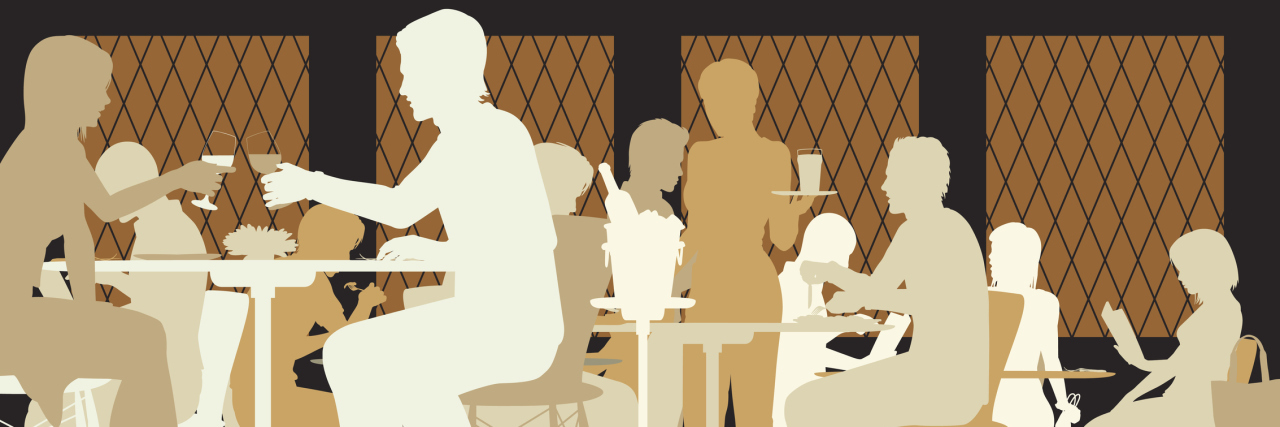If My Child With a Disability Is an 'Inconvenience' to You, You're Welcome to Leave
Sometimes the news isn’t as straightforward as it’s made to seem. Ellen Stumbo, The Mighty’s Parenting Editor, explains what to keep in mind if you see this topic or similar stories in your newsfeed. This is The Mighty Takeaway.
On August 5, Amanda Braun and her family went to enjoy a meal at an Outback Steakhouse in Glen Burnie, Maryland. The meal was relatively uneventful for the family until a manager approached and asked them to finish quickly because of a noise complaint. The complaint regarded Braun’s 4-year-old son, Killian, who has apraxia of speech, a motor speech disorder which causes difficulty programming and planning speech.
Kids with apraxia struggle to produce the precise and specific movements in their tongue, lips and jaw necessary for intelligible speech. Kids know what they want to say, but have a hard time getting the right sounds out.
In a Facebook post that has been shared more than 3,500 times, Braun explained her son is an energetic child with much to say. When he speaks, however, his words are unclear. The manager was apologetic, offering them a $20 gift certificate. But after their negative experience, the family will dine elsewhere. Braun wrote:
Why would I subject my son and the rest of my family to that type of discrimination? What would ever make me want to return? Would we be asked to leave again if my son were to be loud?
Saturday night the family and I decided to go to Outback Steakhouse in Glen Burnie for dinner. We were seated almost…
Posted by Amanda Jean Braun on Monday, August 5, 2019
Personally, I have never gone to a family-friendly restaurant and expected to have a “quiet” dinner. As a matter of fact, family-friendly restaurants tend to be somewhat loud.
My youngest daughter, who has Down syndrome, also has sensory processing disorder and for years we were unable to eat at restaurants — the noise was too overwhelming for her. Even with noise-canceling headphones, she couldn’t handle it. If there was a baby and that baby cried, that was our cue to get out.
Now that my daughter is 11 years old, she loves going out to eat, so we do. We have been to restaurants where there are large parties, loud laughter, friends talking loudly and squealing teenagers among other loud restaurant noises. We have also been to restaurants and seen non-verbal adults enjoying their time and vocalizing — and people stare.
I get it, there are noises people are unfamiliar with, so those new sounds may not “blend” in the background like others do. However, unfamiliar sounds are not offensive, and shouldn’t be treated as such.
I have seen a fair share of energetic kids at restaurants being “loud.” It’s what kids do. However, singling out a child because they talk differently than other kids their age is not only rude, it is ignorant too. As Braun said, it is discriminatory. If you go to a family-friendly restaurant, expect energetic 4-year-olds to be loud. If a child sounds different than what you are used to, that’s on you, not the child.
Sadly, this is not the first time a child with a disability has been discriminated against for being themselves. Apparently, some people still believe children with disabilities should not be out in public or else they may make other people’s experiences unenjoyable as if our kids are “inconvenient.”
To people who think this way, I wonder why you believe your needs are more important than others? That seems to be the underlying belief, “I matter more than you, and what you’re doing bothers me in some way, so it is only fair you be removed from my presence.” It’s a self-centered and selfish way of thinking, not to mention a reflection of negative disability attitudes that still perpetuate our society.
Our kids with disabilities have the same right as anyone else to be in public places and participate in our society. They belong.
I am tired. I am tired of other people seeing our kids as “inconvenient.” Not only at restaurants but in this world. When people are out and see our kids as “inconvenient,” they are more than welcome to leave. They do not have to stay around us.
Maybe Braun’s son was being loud, maybe not, but it was a family restaurant an overall “noisy” place. The person making the complaint could have asked to be moved. Or they could have gone to a nice restaurant, where you can expect to have some “quiet.” There are upscale restaurants where I would want to enjoy my meal without loud children or crying babies. There is a time and place for a little “quiet.” Family-friendly restaurants do not count.
A 4-year-old with a speech disorder acting like a child should not be seen as offensive. We need to stop complaining about children who are different. They are children, not an “inconvenience.” What type of messages are we sending future generations?
For now, we will keep fighting for understanding and inclusion. We will keep holding establishments accountable so they provide disability awareness and sensitivity to their employees. That way, when issues like these come up, people are better prepared to deal with their customers.
Other stories that may be of interest to you:
Getty image by AdrianHillman

